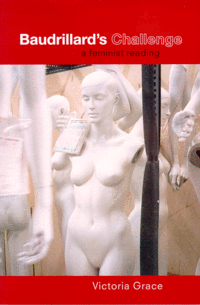

![]()
![]()

The theme running throughout Grace's book is Baudrillard's own career-long development of a critical opposition between the dominant order of value (both economic and significatory), its code of control, and its devotion to the order of the real, production, materialisation, and hence also to full and present identity and subjectivity, and another order of relations and meaning; one derived from the radical Durkheimian tradition of philosophic and social anthropology, and characterised by Baudrillard as the 'symbolic' or 'symbolic exchange'. Much of the hostility Baudrillard's work has generated is due to the obscurity of this intellectual tradition in the English-speaking world and a resultant misunderstanding of Baudrillard's project, but Grace clearly grasps its critical role in Baudrillard and its significance for a Feminism which aspires to formulate and valorise an alternative 'identity', 'difference' or 'subjectivity' to the opposing and dominant masculine values. After introducing Baudrillard's critique of this logic of value and exchange (ch.1), Grace argues that Feminist attempts to rethink gender and sexual identity, such as in the work of Irigaray, Braidotti, and Butler (ch.2), and Feminist debates around 'difference' (ch.3), all remain implicated in the dominant order of value, in contrast to the 'symbolic' and its 'otherness' which falls outside, is destroyed by, and itself returns to destroy that order. On this basis Grace also offers a Baudrillardian critique of 'transgenderism' as not a liberatory but a conservative playing with signs (ch.4), convincingly defends Baudrillard's conception of 'seduction' as, not the outrageous provocation Irigaray, Plant and Burchill have assumed, but a symbolic mode of relations and meaning and a strategy against this dominant productivist order of value (ch.5), and considers also Baudrillard's defence of poetic language as a symbolic site resistant to this order (ch.6).
With an obvious understanding of the complexities of each position, Grace clearly establishes the limitations of a Feminist discourse that remains within an order of value and exchange defined either against or with its opposite and, that, in seeking an equivalent value, merely repeats and reinforces its operation. She also establishes the importance of Baudrillard's attempt to think a symbolic order that is external to this, although this does assume the truth, superiority, and radical force of that other, symbolic, order, which Grace noticeably fails to submit to the same critical scrutiny as the semiotic. To her credit she ignores the many scattered journal comments by Baudrillard on the subject of women and Feminism which were largely responsible for the initial hostility, to focus instead on the substantive content of his work and, in doing so, makes a convincing case for a wider reading and appreciation of Baudrillard. On that level this is one of the most important contemporary readings of Baudrillard, but I have one reservation: that as, in the gift, it is the very life of the participants that is at stake, Baudrillard's 'challenge' may aim at something very different from agreement, reconciliation and use. But perhaps that is how it should be: I prefer my Baudrillard with a whiff of sulphur.
William Merrin
Leeds Metropolitan University